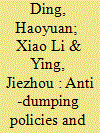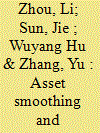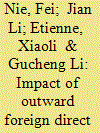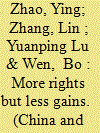|
|
|
Sort Order |
|
|
|
Items / Page
|
|
|
|
|
|
|
| Srl | Item |
| 1 |
ID:
191150


|
|
|
|
|
| Summary/Abstract |
Anti-dumping policies, as one of the most important nontariff measures to protect a country's economic interests, can have an impact not only on a country's trade and social welfare, but also on capital flows. Anti-dumping measures can result in increased trade costs and alterations to exchange rate risk. This study investigates the impact of anti-dumping sanctions on the international portfolio allocations of global funds. Antidumping policies can decrease the proportion of a fund's investment portfolio allocated to recently-sanctioned countries. Closer trade ties between the sanctioned country and the country where a fund is domiciled exacerbate the divestiture, but stronger foreign direct investment links weaken the negative association. Some country and fund heterogeneities are also discussed. We find that more developed countries are less affected by the impact of anti-dumping measures on equity fund allocations; liberalization of the economy and stable government could also mitigate the negative impact of anti-dumping sanctions. High-risk funds, such as growth funds or funds that invest in leveraged buyouts, showed the greatest response to changes in anti-dumping regulations.
|
|
|
|
|
|
|
|
|
|
|
|
|
|
|
|
| 2 |
ID:
191158


|
|
|
|
|
| Summary/Abstract |
Do households sell assets in order to smooth consumption? The empirical evidence is mixed. Using household- and village-level data in the context of China's poverty alleviation policy, we analyze the relationship between climate shocks and household coping behaviors from the perspective of whether coping strategies to deal with weather shocks are sensitive to the contiguity of destitute areas. Our results indicate that, unlike households living in noncontiguous destitute areas, households struck by weather shocks in contiguous destitute areas tended not to reduce or liquidate assets. To overcome weather shocks, households in contiguous destitute areas instead reduced household consumption, such as food consumption and increased nonfarm working hours. Our findings point to the possibility that the implicit assumption of consumption smoothing coupled with a failure to incorporate explicitly the factor of contiguous regions has led to seemingly divergent findings in the literature regarding consumption smoothing.
|
|
|
|
|
|
|
|
|
|
|
|
|
|
|
|
| 3 |
ID:
191157


|
|
|
|
|
| Summary/Abstract |
To stimulate economic growth, the Chinese government implemented three consecutive policies between 2016 and 2019 to reduce the corporate endowment insurance contribution ratio (CEICR), the highest payment item for Chinese companies. Using China's CEICR reduction policies as a quasi-natural experiment, this paper evaluates the impact of corporate payment burden reduction on employee wages. Generally, reducing CEICR appears to prompt companies to increase employee wages. Corporate cash flow is a possible channel of influence. Moreover, the positive effect is found to be more pronounced in companies that are more labor intensive, performing better in labor payment compliance, and located in regions with higher pressure for elderly care. This paper offers evidence in favor of implementing CEICR reduction policies from the perspective of improving the well-being of employees.
|
|
|
|
|
|
|
|
|
|
|
|
|
|
|
|
| 4 |
ID:
191155


|
|
|
|
|
| Summary/Abstract |
With rapid urbanization, millions of rural villagers have become urban citizens in China. This paper estimates the effect of the in situ urbanization policy on an individual's health by employing the difference-in-differences framework and using panel survey data from the China Family Panel Studies. Our findings show that this program, unlike other kinds of urbanization, which have had negative impacts on mental health or made people smoke or drink more, increased people's self-reported health status significantly. Further mechanism analysis reveals that the in situ urbanization policy affected health by increasing people's confidence in the future, their satisfaction with their current lives, and their medical insurance enrollment. This study highlights the importance of “the city comes to villagers” urbanization in China, and it can play an essential role in advancing the urbanization rate and avoiding the negative impacts of urbanization on health.
|
|
|
|
|
|
|
|
|
|
|
|
|
|
|
|
| 5 |
ID:
191154


|
|
|
|
|
| Summary/Abstract |
This study examines the impact of outward foreign direct investment (OFDI) on Chinese manufacturing firms' financialization and servitization. Using a difference-in-differences approach with propensity score matching, we found that OFDI encouraged firms' financial and service activities. The effects of OFDI on financialization were stronger for firms specializing in short-term financial assets, operating in labor and technology-intensive sectors, investing overseas to pursue production, resources and markets there, and investing in non-OECD and Belt and Road Initiative (BRI) countries. Meanwhile, firms investing overseas were more likely to provide services at the sale or postsale stages. Outward foreign direct investment has also boosted the service activities of firms operating in the technology-intensive sector by investing overseas to seek resources and markets, as well as investing in non-OECD and BRI countries. Finally, OFDI partially influenced the extent of financialization and servitization of firms by affecting their profit-making ability.
|
|
|
|
|
|
|
|
|
|
|
|
|
|
|
|
| 6 |
ID:
191148


|
|
|
|
|
| Summary/Abstract |
We build a simple overlapping generation model to investigate the effect of life expectancy on the real exchange rate where fertility is chosen endogenously. The model reveals that, although the overall effect of life expectancy on the real exchange rate is not certain, longer life expectancy tends to cause the real exchange rate to depreciate by reducing fertility. Fertility thus serves as a mediator in the effect of life expectancy on the real exchange rate. Evidence from 148 economies (1980–2018) shows a statistically significant and robust negative relationship between life expectancy and the real exchange rate. It is estimated that a 1 year increase in life expectancy is associated with a 1.5 percent depreciation in the real exchange rate. The evidence also confirms the mediated effect of fertility. The mediated effect that fertility exerts accounts for 30 percent to 50 percent of the total effect, depending on the real exchange rate index used.
|
|
|
|
|
|
|
|
|
|
|
|
|
|
|
|
| 7 |
ID:
191156


|
|
|
|
|
| Summary/Abstract |
In view of its aging population, China initiated in 2012 a relaxed birth control policy after a three-decades-long implementation of the restrictive one-child policy. This paper examines how China's relaxed birth control policy leads to gender inequality. It specifically focuses on migrant workers because they account for a significant portion of the working group. Using the National Migrant Population Dynamic Monitoring Survey from 2014 to 2016, we found that China's two-child pilot policy reduced female labor force participation by 1.4 percentage points. This negative effect was more pronounced for women with higher educational levels or working in the private sector because employers foresee greater risks of productivity decline. We demonstrated that the gender pay gap increased from RMB956 to RMB1,053 during this same period. Pinpointing these unintended consequences brought about by the relaxation of the one-child policy helps provide a more complete picture of inequality and make sense of persistent relative poverty in Chinese society. To counteract gender discrimination, females are advised to work outside their home jurisdictions and take advantage of positive peer effects.
|
|
|
|
|
|
|
|
|
|
|
|
|
|
|
|
| 8 |
ID:
191153


|
|
|
|
|
| Summary/Abstract |
Previous studies focus on the direct impacts of environmental regulations while paying less attention to spillover effects. Taking the Eleventh Five-year Plan in China as a quasi-natural experiment, our results show that environmental regulations significantly increase the tax burden of unregulated firms. Environmental regulations generate spillover effects on firms that should not be subjected to regulatory policies. Further channel analysis shows that the fiscal pressure of local governments caused by environmental regulations is a major channel for the increase in the tax burden of unregulated firms. Finally, according to the heterogeneity results, the spillover effects are more pronounced in small firms, non-state-owned enterprises, and provinces with stricter enforcement. Our findings emphasize the additional costs of environmental policies, and the government should consider these costs when formulating policies.
|
|
|
|
|
|
|
|
|
|
|
|
|
|
|
|
| 9 |
ID:
191147


|
|
|
|
|
| Summary/Abstract |
This paper improves the estimation of firm-level total factor productivity (TFP) by considering energy use and including small- and medium-sized enterprises using data from the Chinese National Tax Survey Database (2008–2011). It analyzes the production efficiency of Chinese manufacturing firms using the improved TFP data and finds that (i) the TFP data frequently used in previous studies overestimated firms' real production efficiency; (ii) the TFP of manufacturing firms decreased from 2008 to 2011 due to declines in both technical efficiency and allocation efficiency; (iii) the lower capacity utilization of production factors led to lower technical efficiency; and (iv) allocation efficiency decreased more in provinces and industries with higher shares of state-owned enterprises. The findings have policy implications for enhancing growth potential in the long run.
|
|
|
|
|
|
|
|
|
|
|
|
|
|
|
|
|
|
|
|
|